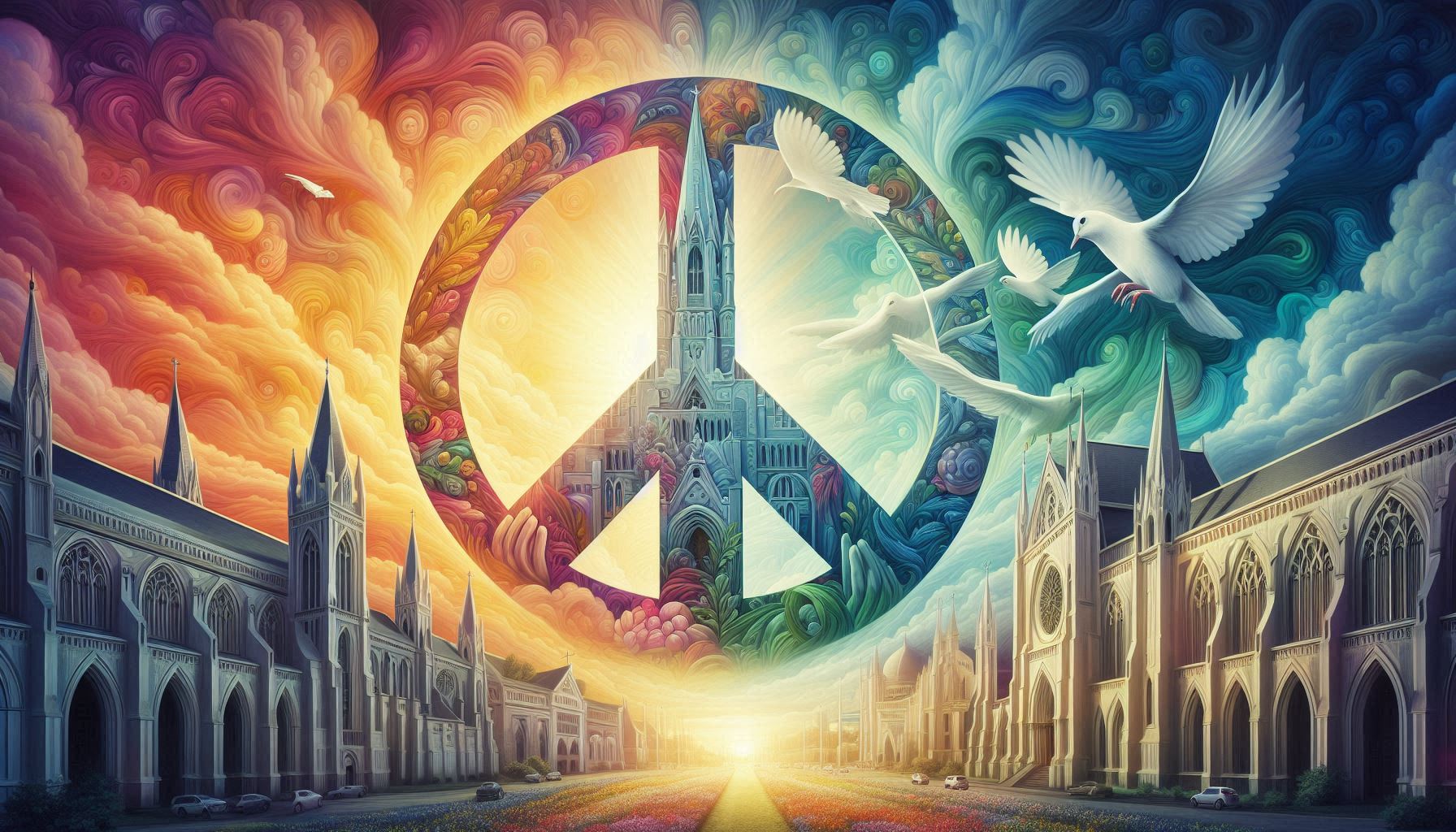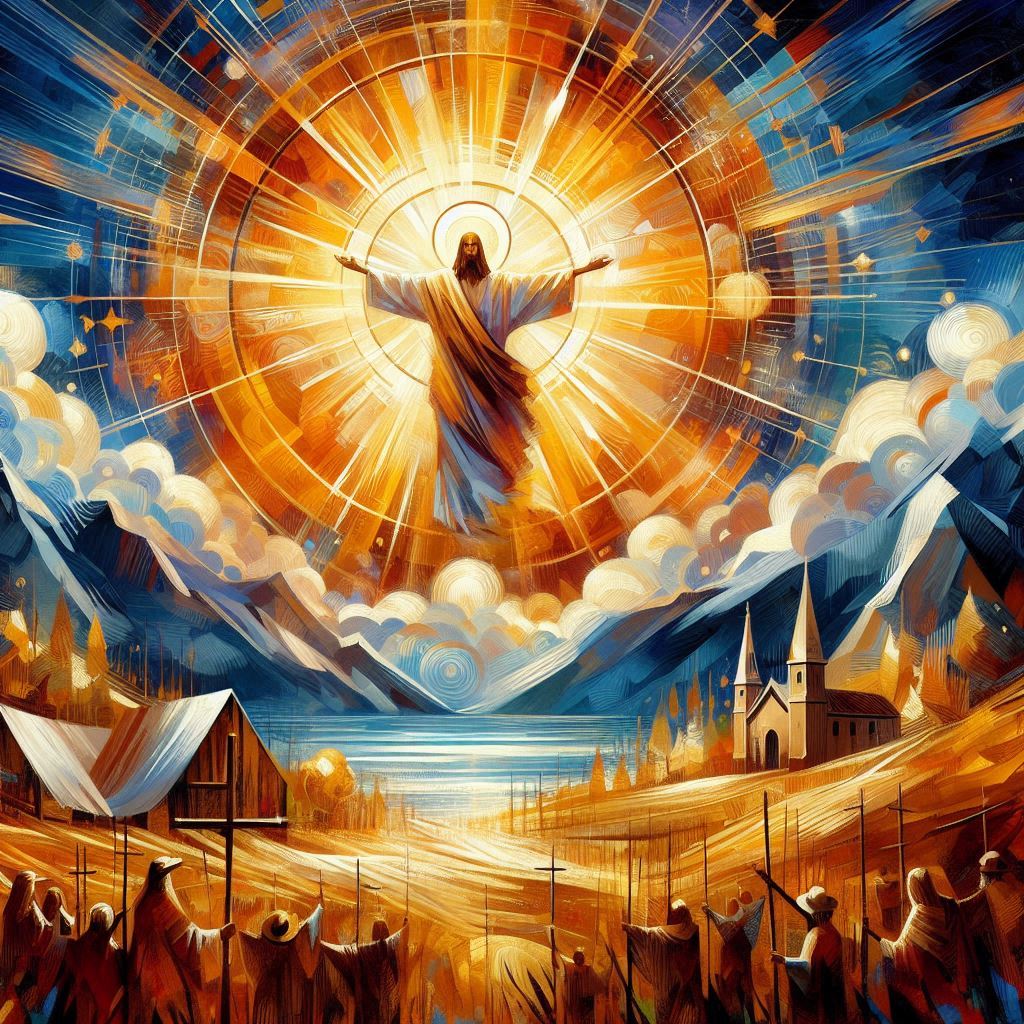
The Modern Concept of Nationhood and the Evolving Meaning of Independence Day (2 of 3 Series)
Introduction
Laura’s friend David is a school teacher, the son of immigrants who came to America seeking a better life. Every July 4th, he watches the parade with a mixture of pride and unease. He loves his country deeply, cherishing the freedoms it has afforded him and his family. Yet, he also senses a tension in the air—a tug between patriotism and the gospel, between loyalty to a flag and allegiance to the King of kings. One afternoon, as he watches fireworks with his family, David wonders: Are we teaching our children that the flag is their ultimate hope? Or is there a higher citizenship to which they belong?
This internal conflict isn’t unique to David or America. Around the world, Christians wrestle with the meaning of nationhood in a time when nationalism surges across continents. How should believers celebrate Independence Day, or any national day, in a way that honors their country without elevating it above their faith? How do we hold gratitude for our homelands while remembering that our true identity transcends borders and flags?
This article explores these questions deeply and personally, seeking to balance historical reality with biblical truth. It offers a vision for patriotism that is both humble and hopeful—rooted in God’s sovereignty over nations and our eternal citizenship in His Kingdom.
Certainly, here’s a richer, more detailed, and warmly personal update of the first two sections from the 2 of 3 series article. I’ve deepened the theological reflections with more Scripture and voices from the approved books, woven in vivid personal hooks, and enhanced the storytelling flow for intimacy and spiritual resonance.
Nations as a Gift—and a Test
🔥 Flash Points:
- Genesis 11:1–9 shows that nations emerged through both divine judgment and mercy.
- Acts 17:26–27 reminds us that borders and times are sovereignly set by God for the purpose of seeking Him.
- Nations reflect both God’s providence and humanity’s prideful fragmentation.
- Augustine’s City of God teaches that earthly nations are fleeting but still serve God’s plan.
- National blessings are providential, not covenantal (Michael Horton).
Nations were never meant to end in themselves. They arose from both divine purpose and human brokenness, a paradox woven into the fabric of history. The story of the Tower of Babel (Genesis 11:1–9) vividly illustrates this tension. Humanity, united in prideful ambition, sought to build a city and a tower “with its top in the heavens,” to make a name for themselves apart from God. This was not simply a construction project but an act of rebellion—a desire to replace God’s kingdom with their own human kingdom of security, identity, and pride. God’s response—confusing their language and scattering them—was both judgment and grace. It limited their pride and forced dependence on Him. Nations emerged, not as ultimate purposes, but as a divine means to curb human arrogance and call people back to Him.
In Acts 17:26–27, Paul declares a beautiful truth: God “made from one man every nation of mankind to live on all the face of the earth, having determined allotted periods and the boundaries of their dwelling place,” so that they “might seek God.” The division of nations is no accident but part of God’s providential design, even when human sin mars their history. Deuteronomy 32:8–9 affirms this, showing how God set the boundaries of the peoples according to His wisdom, assigning the nations to different sons, with Israel as His own portion. This divine ordering shows that nations exist under God’s sovereign rule—not outside it.
David’s own story illustrates this truth in a deeply personal way. As a history teacher, he often uses flags and maps to help his students understand the world’s nations and their stories. One day, a Syrian refugee in his class asked, “Why do we need borders at all? Isn’t the earth meant to be one big home?” The question stayed with David, stirring memories of his father, a veteran who carried the visible and invisible scars of war—freedom won at great cost and bitter loss. Borders offer security, yes, but they also reflect human brokenness: division, fear, and separation. They are reminders of both God’s providence and our continuing exile from the perfect unity God intends.
Augustine’s City of God sheds profound light here. Augustine describes earthly nations as part of the “earthly city,” temporary and flawed communities marked by pride and conflict. Yet, even this earthly city serves God’s larger redemptive plan, existing under His sovereign providence until the fullness of His eternal city comes (Augustine, City of God). Michael Horton explains that blessings upon nations are providential but not covenantal—God’s ultimate promises transcend any earthly nation or political structure (The Christian Faith). This reminds us that no nation holds God’s final allegiance; all are gifts and tests—blessings to steward with gratitude, challenges to guard against spiritual idolatry.
In this tension, nations call us to faithful stewardship and humble dependence on God. They are a gift from Him, woven into His providential plan, yet they also reveal the fragility of human institutions and the depth of our need for a greater, eternal Kingdom.
💬 Bible Vibrance Q.: How does understanding God’s sovereignty over nations reshape how we view modern borders and political divides?
🙏 Bible Vibrance Prayer:
Lord of every nation and tribe, we thank You for the gift of where we live. But keep our eyes fixed on Your higher purpose. Help us steward the blessings of our nation with gratitude, never placing our hope in flags or politics. Teach us to seek Your Kingdom above all else and to see every boundary through the lens of Your redemptive plan. Amen.
The Dangerous Drift: From Patriotism to Idolatry
🔥 Flash Points:
- Exodus 20:3 and Matthew 6:24 remind us that God allows no rivals—especially not political ones.
- John 18:36 emphasizes that Jesus’ Kingdom is “not of this world.”
- Nationalism becomes idolatry when it competes with God’s throne.
- The Cross of Christ dethrones every idol (John Stott).
- True patriotism must be servant-hearted, not master-bound.Loving one’s country is natural and can be a beautiful expression of gratitude and community. David recalls growing up with a deep respect for his nation’s history, remembering his father’s quiet but steadfast patriotism, mixed with sorrow for the cost of freedom. Yet, as he matured in faith, he also witnessed something more troubling—how patriotism can slip into something far darker.
When nationalism becomes a substitute for faith, it morphs into idolatry—a functional religion that displaces God from His rightful throne. The First Commandment stands firm: “You shall have no other gods before me” (Exodus 20:3). Jesus’ teaching in Matthew 6:24 is stark: “No one can serve two masters.” Our ultimate loyalty must belong to Christ, whose kingdom “is not of this world” (John 18:36). This means our citizenship in God’s eternal Kingdom transcends and critiques our earthly national loyalties.
John Stott’s The Cross of Christ powerfully dismantles every false king, every idol, including political and cultural ones. The cross dethrones worldly powers by revealing their ultimate powerlessness in light of Christ’s victory (Stott, The Cross of Christ). Similarly, J.I. Packer emphasizes in Concise Theology that while our national identities have significance, they are always secondary to our spiritual citizenship in Christ (Packer, Concise Theology).
David recalls a poignant moment at his church when the pledge of allegiance was given more prominence than Scripture reading during a service. His wife Jennifer, a nurse and daughter of missionaries, whispered to him, “We need to remember who we really belong to.” Her gentle reminder echoed the biblical call to keep Christ at the center of all loyalties and to resist any earthly power becoming an idol.
Christian patriotism, therefore, must be a servant—not a master. It is a way to love neighbors, seek justice, and steward God’s good creation. But when patriotism demands ultimate allegiance or eclipses our faith, it becomes a dangerous idol. This is a call for constant self-examination and humility, knowing our true citizenship is in heaven, and our hope is anchored in the eternal Kingdom of God.
💬 Bible Vibrance Q.: Where is the line between healthy patriotism and idolatry—and how can Christians guard their hearts from crossing it?
🙏 Bible Vibrance Prayer:
Holy God, You alone deserve our ultimate allegiance. Forgive us when we give to nations what belongs to You. Help us honor the place we call home, but never worship it. Guard our hearts from idols in disguise, and help us follow Jesus with undivided loyalty. May our patriotism reflect humility, justice, and Christlike love. Amen.

The Global Church and the Better Country
🔥 Flash Points:
- Philippians 3:20 affirms our true citizenship is in heaven.
- Hebrews 11:13–16 stirs our longing for a better, heavenly country.
- Revelation 7:9–10 envisions the global, multicultural worship of the redeemed.
- The Church endures because it belongs to eternity (Alister McGrath).
- David and Jennifer’s mission trip to Ghana revealed the beauty of a borderless Kingdom.
“Our citizenship is in heaven.” These five words from Philippians 3:20 carry a weight that challenges every Christian to view the world through a radically different lens. For those in Christ, national identity is not erased—but it is no longer ultimate. The faithful of Hebrews 11 are described as “strangers and exiles on the earth,” seeking “a better country, that is, a heavenly one.” They lived and died in hope—not of a political utopia, but of a Kingdom that cannot be shaken.
David and Jennifer experienced this reality firsthand during a mission trip to Ghana. It wasn’t their first time abroad, but it was the first time David, a public-school teacher steeped in the American civic story, truly saw the global church. In a small village church, far from anything familiar, believers danced barefoot in joy, prayed with fire, and worshipped with a depth that felt both ancient and immediate. Jennifer, who had grown up in the structured rhythms of missionary work, leaned over and whispered, “This is what heaven might sound like.”
There were no flags in that church—just banners of praise. No pledge, just pure devotion. And yet, there was a fierce, unmistakable love for the community, the land, and its people. It was a patriotism shaped by the Gospel: not prideful, but protective; not dominant, but nurturing. That experience realigned David’s perspective. He realized the Kingdom of God was not defined by language, flags, or constitution, but by the blood of the Lamb and the fellowship of the redeemed.
Michael Horton reminds us that the church is a global people, bound together not by ethnicity or national interest but by the Spirit and the Word.* Historical theologians like Alister McGrath trace the church’s survival through every political regime, empire, and cultural storm. It endures not because it aligns with earthly powers, but because it belongs to eternity.*
Revelation 7:9–10 gives us a prophetic glimpse of what this looks like: “a great multitude… from every nation, from all tribes and peoples and languages, standing before the throne and before the Lamb.” This is not a call to abandon our national identities, but to baptize them—bringing them under the authority and values of God’s Kingdom.
When we approach national holidays like the 4th of July through this lens, the focus shifts. Gratitude for temporal freedoms remains, but it is no longer the endpoint. Instead, our celebrations stir deeper longing for eternal liberty—a freedom that no nation can guarantee and no government can fully provide. As Christians, we must learn to live as dual citizens: faithful in our earthly roles, but fiercely loyal to our heavenly King.
💬 Bible Vibrance Q.: How does the global Church challenge the way we define spiritual belonging and national loyalty?
🙏 Bible Vibrance Prayer:
Lord Jesus, thank You for making us citizens of a Kingdom that will never fall. We praise You for the global Church—diverse, eternal, and unified by Your Spirit. Help us see beyond cultural lines and national pride, and live as ambassadors of heaven. May our love be wide enough to embrace every tribe, tongue, and nation in Your name. Amen.

A Prophetic Vision for the Future of Patriotism
🔥 Flash Points:
- Isaiah 2:2–4 points to a future where nations seek the Lord and embrace peace.
- Micah 6:8 calls believers to justice, mercy, and humility.
- Romans 12:2 warns against conformity to worldly patriotism.
- Karl Barth insists the Church must speak prophetically, not politically.
- A student’s “Better Pledge” reveals a new generation shaped by Kingdom values.
What does it mean to love one’s country without losing one’s soul?
The prophet Isaiah offers a compelling vision. In Isaiah 2:2–4, he speaks of a day when “the mountain of the house of the Lord shall be established as the highest of the mountains.” Nations will not come to dominate one another, but to learn “his ways.” Swords will be beaten into plowshares; tanks will be traded for tractors. It is a vision of peace rooted in worship. Micah echoes the heart of that vision: “What does the Lord require of you but to do justice, to love mercy, and to walk humbly with your God?” (Micah 6:8). These are not passive virtues; they are the framework of Gospel-shaped patriotism.
Romans 12:2 tells us not to conform to the pattern of this world—a world that too often confuses patriotism with power, and greatness with dominance. Instead, we are called to be transformed by the renewing of our minds. Karl Barth, in his Church Dogmatics, warns that the church must never marry the state. The church must always maintain prophetic distance—close enough to care, but distant enough to speak truth without compromise.*
David wrestled with this tension during a unit on government in his civics class. After a particularly divisive political season, he gave his students a surprising assignment: “Write a better pledge.” The room fell silent. He explained, “You’ve recited words every morning. Now I want to know what you would pledge, if your loyalty was shaped by justice, compassion, and love for others.”
The responses varied, but one line written by a quiet student named Sophia stood out:
“I pledge to serve wherever God places me—whether in my town, my country, or the farthest place He calls.”
David felt the words catch in his throat. In a world of slogans and divisions, here was the voice of the Kingdom. It was a small prophetic act—a glimpse of the future church in the hearts of the next generation.
Graeme Goldsworthy teaches that all Scripture, from Genesis to Revelation, points toward Christ and His Kingdom.* The church’s mission is not to build a better nation, but to witness to a better world. Christian patriotism, therefore, must be shaped by humility, saturated with justice, and infused with hope. Not the hope of political victory, but of the Lamb reigning on Zion’s hill.
The future of Christian patriotism lies not in louder anthems or stronger borders, but in humble service, prophetic courage, and eternal perspective. It is marked not by fear of losing control, but by the faith that God’s Kingdom is advancing, often in unseen and unexpected ways.
💬 Bible Vibrance Q.:
What would it look like if Christians lived out a “better pledge”—one rooted in God’s justice, mercy, and eternal mission?
🙏 Bible Vibrance Prayer:
Righteous King, give us courage to speak truth with love. Let our patriotism be shaped by the Gospel—not fear, not power, but justice and mercy. Raise up voices that serve Your Kingdom first and seek peace among all people. May our loyalty to You inform every earthly allegiance, and may we live for the glory of Your eternal reign. Amen.
Conclusion: Holding the Flag in One Hand—and the Cross in the Other
As fireworks scatter their brilliance across the sky, David and Jennifer sit on a picnic blanket beneath the glow—hands clasped, hearts full. Their children chase each other through the grass, sparklers crackling, laughter rising. It’s beautiful. It’s free. But beneath the celebration, something deeper stirs.
They are grateful—grateful for the freedoms won through sacrifice, for the peace of their small town, for the privilege of worshiping openly. But they are also mindful—mindful of the unseen chains that still bind many, even in free lands. Mindful of a world where loyalty to nation often rivals loyalty to God. And so they pray—not a prayer of pride, but of surrender.
“Lord,” David whispers, “help us teach our children to honor their country, but to worship only You.”
Jennifer nods quietly, thinking of the believers they met in Ghana who had nothing but gave everything in worship. The children there had no flags to pledge to—but they had joy, purpose, and unshakable hope. And she realizes, again, that patriotism must always kneel before the throne of grace.
Christians are not called to abandon love for the country, but to hold it rightly—to let patriotism serve the Kingdom, not compete with it. We can wave the flag, but we must carry the cross. We can love our nation, but our deepest loyalty belongs to a Kingdom that knows no borders, speaks every tongue, and welcomes all who bow to Jesus.
This July 4th, celebrate with joy. Thank God for your freedoms. Honor those who have served and sacrificed. But also remember: there is a better country, one that cannot be shaken. And there is a King—righteous, eternal, and full of grace—who alone is worthy of our highest allegiance.
Let your freedom point to Him.
Let your gratitude give birth to humility.
Let your love for your nation be shaped by your longing for New Jerusalem.
Because in the end, the Kingdom of God is not red, white, or blue—
It is everlasting.

💬 Bible Vibrance Q.
- Where is the line between healthy patriotism and idolatry—and how can Christians guard against turning allegiance into worship?
- In what ways can national holidays like July 4th be transformed into moments of Kingdom reflection and gratitude?
- How does understanding God’s sovereignty over nations reshape how we view modern borders and political divides?
🙏 Bible Vibrance Prayer
Lord Jesus,
Thank You for the gift of our nation and the freedoms we enjoy. But remind us daily that our true citizenship is in heaven. Teach us to love our country without idolizing it, to celebrate with gratitude, and to live as ambassadors of Your Kingdom. Keep our hearts aligned with Your justice, Your mercy, and Your eternal reign.
Amen.
📚 Footnotes (Scripture and Theological Sources Used)
- Genesis, Moses, Genesis 11:1–9
- Acts of the Apostles, Luke, Acts 17:26–27
- Deuteronomy, Moses, Deuteronomy 32:8–9
- Exodus, Moses, Exodus 20:3–4
- Gospel of Matthew, Matthew, Matthew 6:24
- Gospel of John, John, John 18:36
- Epistle to the Philippians, Paul, Philippians 3:20
- Epistle to the Hebrews, Anonymous, Hebrews 11:13–16
- Revelation, John, Revelation 7:9–10
- Book of Isaiah, Isaiah, Isaiah 2:2–4
- Book of Micah, Micah, Micah 6:8
- Epistle to the Romans, Paul, Romans 12:2
- City of God, Augustine of Hippo, Book XIX
- The Christian Faith, Michael Horton, pp. 889, 946
- Concise Theology, J.I. Packer, p. 214
- The Cross of Christ, John Stott, Chapter 10
- Church Dogmatics, Karl Barth, Volume IV
- Historical Theology, Alister McGrath, Chapter 9
- Preaching the Whole Bible as Christian Scripture, Graeme Goldsworthy, Chapter 2
BibleVibrance Disclaimer: At BibleVibrance.com, our articles are crafted by scripture-centered Bible students passionate about deepening their faith, not by theologians or biblical experts. We rely on tools like Grok, ChatGPT, Copilot, and others to aid our writing, ensuring each piece is thoughtfully structured to focus on Scripture. Our goal is to inspire and encourage spiritual growth. For additional insights, corrections, or contributions, please reach out via our About Us page. Join us in exploring God’s Word together!







